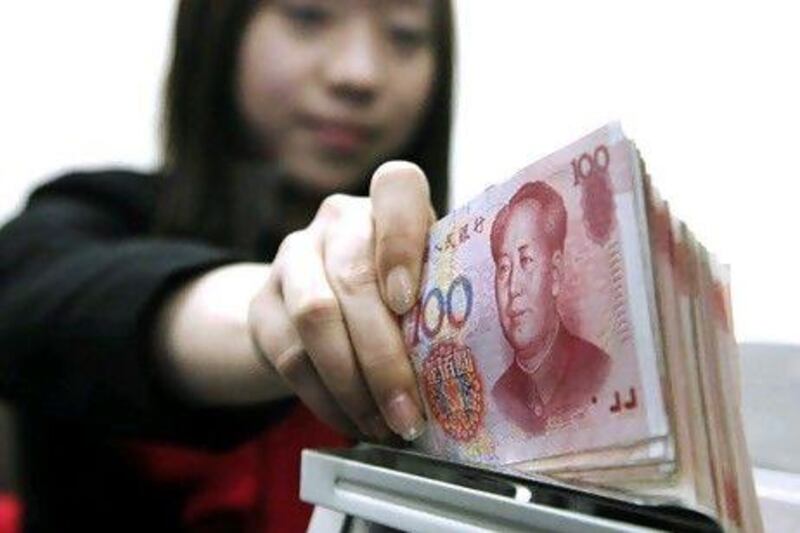Eric Fu may soon pay for the steel, wood, cables and other materials he buys from China in that country's currency.
At the moment, the US$4 million (Dh14.6m) in materials his company, China National Building Materials Group (CNBMG), ships from China to the UAE every month is paid for in US dollars.
But agreeing to price and pay for the goods in yuan, or renminbi to give it its official name, would enable the company to negotiate better terms with Chinese suppliers . More and more suppliers in China are keen to deal directly in their local currency to avoid the risk of a fluctuating exchange rate, particularly as the dollar continues to slide against the Chinese unit.
"If we can take advantage of that it would be easier to trade," says Mr Fu, the general manager of CNBMG in the UAE.
The company is one of the growing numbers of businesses banks in the UAE are seeking to engage as they try to tap the China market.
As China loosens its grip on its currency and financial system, the yuan's profile in the UAE has slowly risen, as it has across the rest of the world.
The trend is a reflection of the UAE's growing ties with China, the world's fastest-growing economy and its largest exporter.
Trade between the two countries reached $35 billion last year and is tipped to reach at least $100bn by 2015. At the same time the number of Chinese firms in the UAE has swelled to about 3,000.
International banks have been the first to move since the People's Bank of China began easing controls on the yuan's international use in 2010, triggering a scramble among banks around the world.
In the UAE, HSBC completed the Middle East's first cross-border yuan trade transaction in September 2010. A month later Standard Chartered became the first foreign bank in the region to open a yuan account for a customer. The customer, the Rivoli Group, a luxury retail chain headquartered in Dubai, wanted to enable visiting Chinese consumers to pay for goods in their domestic currency.
Now local banks are looking to carve out a slice of the action. Mashreq last month became the first local bank in the Middle East to offer offshore yuan services. Several others are believed to be considering similar steps.
"We are seeing concrete demand from our customers to do transactions in renminbi," says Hugo Perez, the head of global transaction services at Mashreq. "At the moment, most of our transactions are not settled in the renminbi but sooner or later this will change."
Mashreq's account services will allow commercial contracts to be drawn up in yuan, allowing Chinese suppliers to invoice and receive settlement from UAE buyers in the currency.
Paying in yuan has its benefits for UAE businesses.
Royal Palace Furniture, a manufacturer and retailer in Ajman, has been using the yuan to pay for about a fifth of the raw materials it imports from China since October 2010.
"Those vendors who are willing to accept it, we can usually negotiate a discount from," says Chandra Krishnamoorthy, the director of Royal Palace Furniture.
Being prepared to pay in the currency enabled Middle East businesses to negotiate between a 5 and 7 per cent discount with suppliers, estimates Tim Evans, the regional head of trade and receivable finance, at HSBC in the Middle East and North Africa.
"A lot of large corporates in this part of the world have been willing to start a dialogue with exporters in China, while the middle-sized companies are still adopting a sort of wait-and-see approach," he says.
Standard Chartered in the UAE has handled a 400 per cent rise in yuan transactions so far this year compared with the same period last year.
There is another reason suppliers in China are increasingly amenable to receivables in yuan, instead of the de facto global trade currency, the dollar.
"When you pay in renminbi it will go faster through the Chinese clearing system," says Haytham El Maayergi, the head of transaction banking in the UAE at the bank.
Increasing use of the yuan in the UAE is a reflection of the global trend. Worldwide yuan transactions have risen 17-fold since October 2010, faster than any other currency.
The currency is likely to receive a further boost as China considers other ways to give it more international muscle. Two years ago, Hong Kong became the first testing ground outside mainland China for a freer yuan and sales of yuan bonds in the city have since risen. Singapore and London are among cities jostling to join Hong Kong. The Dubai International Financial Centre (DIFC) has also been discussing plans to permit transactions in the currency, DIFC officials were quoted by Reuters as saying in February.
If Dubai does become an offshore trading centre for the currency, a rising tide of investment is likely to join the building materials traded by the likes of Mr Fu between the two nations.





